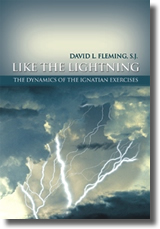In his introduction Father David Fleming tells his readers: “I do not intend to write a commentary on the Exercises…I am not writing a ‘how to’ book…I hope rather to reflect on the Exercises as a unit in their integral makeup and in their overall movement.”
In the first week of the Exercises, according to his analysis, one is moved with gratitude to God who in the abundance of his mercy forgives the contrite sinner. The second week draws the forgiven sinner to work with Christ in establishing his kingdom among men. In the third week the consideration of his suffering engender compassion for Christ who goes to his death “for me, for my sins.” With the contemplation of the risen Christ in the fourth week the dynamics move the exercitant to love more and more the way God loves.
 Each week, he observes, has a foundational exercise proper to it. Just as the Principle and Foundation inaugurates the movement of the first week and the Call of the King the second, the Last Supper starts the movement of the third week and the apparition of the risen Christ to his mother is foundational to the fourth week. “The Contemplation on the Love of God,” he writes. “takes its place as the foundation of every day life after the retreat, in as much as it is a natural overflow from our contemplating the appearance of the risen Jesus.” The Principal and Foundation and the Contemplation on the Love of God are, consequently, the bookends of the Exercises.
Each week, he observes, has a foundational exercise proper to it. Just as the Principle and Foundation inaugurates the movement of the first week and the Call of the King the second, the Last Supper starts the movement of the third week and the apparition of the risen Christ to his mother is foundational to the fourth week. “The Contemplation on the Love of God,” he writes. “takes its place as the foundation of every day life after the retreat, in as much as it is a natural overflow from our contemplating the appearance of the risen Jesus.” The Principal and Foundation and the Contemplation on the Love of God are, consequently, the bookends of the Exercises.
Besides the overall movement of each week, Father Fleming perceives that each day there is a movement from more activity to less activity. After two prayer periods, there are two repetitions and an application of the senses where the imagination and not the reason provokes the movements of the will. One function of the examination following the prayer periods is to note these movements.
The author detects two other kinds of dynamics. First of all, he observes that in his teaching method Saint Ignatius moves from an objective reading to a subjective application. In considering, for example, the punishment the merciful God has justly inflicted on Lucifer for his sin, one realizes that he deserves the same punishment for his many sins. Secondly, there is a movement from a personal to a communal focus. In the Call of the King, the call comes to every man but it comes to me personally.
An interior movement is, of course, required for the central act of the Exercises—the choice of a way of life in which to serve God our Lord. The meditations, examinations, petitions and rules for the discernment of spirits prepare the exercitant for this all-important decision. Less important decisions such as the reform of one’s life also require the movement, which these Exercises, given under a competent director, provide.
In focusing on the dynamics, Father Fleming does not neglect the role of the annotations, additional directions and various rules of the Exercises. His work will be of great benefit primarily for those who direct the Exercises and through them for those who will make the Exercises.
James Buckley, F.S.S.P.
Our Lady of Guadalupe Seminary
Denton, Nebr.
Recent Comments